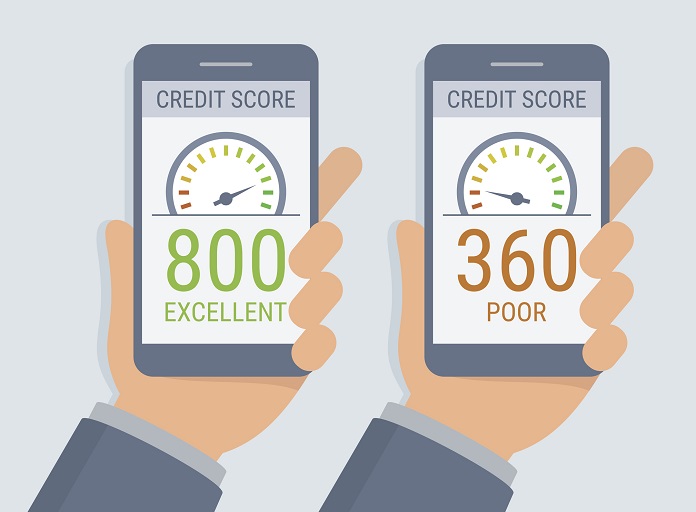With Christmas and New Year over and bills to juggle, at this time of year, lots of people feel they have to turn to credit to tide themselves over. But if you are about to apply for credit, it’s worth doing some preparation and making sure you look in good financial shape to a lender – otherwise, you may run the risk of being offered a worse rate or being rejected altogether. And there might be something you’re doing – or not doing – which, without you realising it, could be detrimental to your attempts to improve your credit rating.
How to improve your credit rating
Here we highlight eight pitfalls which could wreck a good credit score…

1. Not checking your credit report
Ignorance isn’t bliss. By checking your report regularly, you can help protect yourself from a range of potential problems and risks. Also, be aware of errors on your report which can be costly – as it can mean you’re rejected for a loan, mortgage or credit card.
Make sure you check, check and check again and report any incorrect information immediately to the relevant financial body or credit reporting service.
2. Being ‘fashionably late’
A lack of punctuality with your financial obligations is a sure-fire way to ruin your credit rating. As a rule of thumb, lenders respect punctuality – as it highlights that you can successfully meet your current financial commitments on time each month.
3. Making excessive credit applications
Making too many ‘hard search’ credit applications at once can really damage your credit score. Lenders view this as desperate behaviour – even if you’re just shopping around.
There are credit eligibility checkers out there which are helpful resources that give you an idea of what you’ll be accepted for, without damaging your credit score.
4. Credit shyness
While it’s good to be prudent, complete credit shyness can have unintended consequences. It can impact a credit score and the chances of being accepted for a mortgage or car finance, for example, in the future.
5. Failing to spot identity theft
Cyber-crime and fraud are becoming increasingly elaborate, so you may not always know whether you’ve been targeted. However, one way to stay vigilant is through checking your credit report frequently.
If you see any information that doesn’t look correct to you, it’s important to investigate. While it may be a simple error, it could also be a sign of fraud. Contact your bank as soon as you notice any false or wrong information to limit any damage.

6. Using all your available credit
Regardless of whether you pay on time and in full, maxing out your available credit can impact your credit score – as it implies that you’re too heavily reliant on credit. Although there’s no definitive number as such, try only using around 25% of your available credit. This may indicate to lenders that you’re a minimal risk and, in turn, help improve your credit score.
7. Not being included on the electoral roll
There’s more than one benefit in exercising your right to vote and it relates to your credit score. Lenders use the electoral register to check your name and address to prove that you live where you say you do.
8. Building up unused credit
Although there’s no hard and fast rule, for some lenders, unused credit can be a red flag. They’re apprehensive that you could spend all your available credit in one day, and thus struggle to pay back the debt.
It’s advisable to think tactically about which cards you need and use, including store cards, and then make a judgement call on whether they’re really necessary.
Credit score myths busted
Here, TransUnion, which has produced an e-book to help people better understand their credit report and score, debunks some common myths around credit scores…
Myth 1: There’s a credit ‘blacklist’
Credit reports are factual. Finance providers have their own policies when it comes to extending credit. Your credit information is just one factor when they make decisions.
When you apply for credit, each lender assesses your application differently, so rejection from one doesn’t necessarily mean rejection from all. But it is important if you’re rejected not to quickly make multiple credit applications. This can indicate to lenders that you are having problems, which may make them more reluctant to lend to you.
And remember that lenders don’t make their decision solely from your score – other factors are considered too, such as whether you’re likely to be able to afford repayment
Myth 2: Credit reference agencies decide who gets credit
Only the finance provider can decide which customers to offer credit to. Credit reference agencies just provide some of the information lenders use when making the decision, but each finance provider has its own individual lending policies.

Myth 3: Being refused credit always damages your credit score
A finance provider won’t tell credit reference agencies whether they’ve accepted or refused you credit. This doesn’t show on your credit report.
But you should avoid making multiple credit applications in a short period of time, as this can have an impact. Lenders may get the impression that you are in desperate financial straits if you make many applications.
Myth 4: Previous relationships always affect your credit score
Someone else’s credit history may potentially affect your credit applications, which can happen in cases where there has been a financial connection by having a joint agreement. This means being in a relationship or living with someone else doesn’t mean they arbitrarily influence your credit rating. But your partner can affect your score – for better or worse – if there is a financial association. This includes a joint bank account, mortgage or loan.
If you had a financial association with a former partner or spouse but no longer share any joint accounts or financial connections, you can formally disassociate yourself so their financial behaviour cannot impact yours.
Myth 5: Checking your credit score multiple times will damage it
Not true. You can check your credit score as often as you like, with no impact on your score.
It’s important to understand the difference between soft and hard credit searches. Checking your credit score is a soft credit search. This means that no matter how many times you check your score, it won’t have an impact. Hard credit searches do leave a mark, but these are only carried out by lenders when you’ve applied for credit with them.
Myth 6: You only have one credit score
Your credit score may be different depending on which credit reference agency (CRA) you use. Each have different criteria and methods for calculating a credit score.
Myth 7: A bad credit score means no credit at all
Just because someone may have a lower-than-average credit score, does not mean it’s impossible to get access to credit. They may be offered credit at a higher rate of interest though, so it is important to look at ways of improving a credit score, and to shop around before committing.

Myth 8: Your credit history stays with you forever
Financial accounts, credit cards and loans remain on your credit file for six years from the date that they have been settled and closed. This time-frame allows lenders to get a clear understanding of how you’ve managed your financial commitments in the past. After this time, they are automatically removed.
Myth 9: The less credit, the better your score
This is not necessarily true. Lenders like to make informed decisions. If you have limited or no credit history, then lenders have insufficient financial information about past behaviour to use when making their decision.
This may increase your chances of being refused credit. However, that doesn’t mean that spending a lot of money on credit is good for your score. It’s important to find a healthy balance.
Myth 10: You can’t improve your credit score
Nonsense! No matter how bad your credit score, you can always improve it. This could include registering to be on the electoral roll or closing down any unused accounts, for example. But bear in mind, sometimes those improvements take time to be reflected in your score.
Myth 11: A big salary definitely equals a better score
It’s more complicated than this. Someone with a high income or savings may still find it hard to get credit if they have a lot of debts or a history of missed payments. However, your salary or savings may form part of the overall criteria lenders use to decide whether to lend to you.
TransUnion’s free consumer e-book, Getting To Grips With Your Credit Report And Score, is available online.
As well as these tips, remember that if your lender has agreed to a temporary payment holiday on a loan, such as a mortgage, due to Covid-19, this shouldn’t have a negative impact on your credit score. But also bear in mind that credit scores aren’t the only paperwork lenders may look at when weighing up loan applications. They may already know some of your financial history, for example, if you’ve been a previous customer.
You may also be interested in…































































